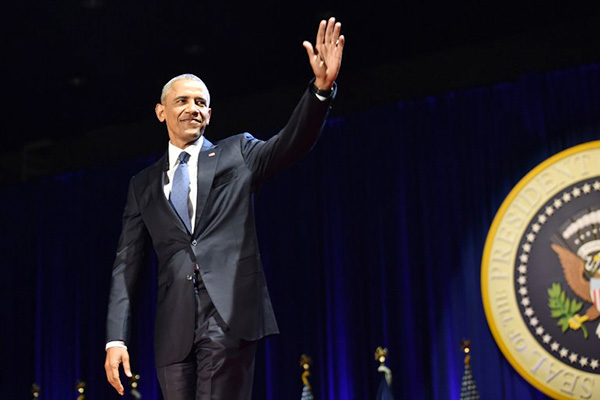
Nicholas Kamm—AFP
In farewell address, Barack Obama urges Americans to unite and focus on rebuilding democratic institutions.
Barack Obama addressed America and the world for the last time as U.S. president on Tuesday, in a speech that was both a tearful goodbye and a call to arms.
Capping eight years in the White House, Obama returned to his adopted hometown of Chicago to recast his “yes we can” campaign credo as “yes we did.”
Surveying the staging posts of his presidency—from the Iran nuclear deal to reforming healthcare—the speech sought to lift supporters shaken by Donald Trump’s shock election. Obama urged them to pick up the torch, fight for democracy and forge a new, fairer, “social compact.”
“For all our outward differences, we are all in this together,” he said, warning that naked partisanship, racism, and inequality all threaten democracy. “We rise or fall as one. All of us, regardless of party, should throw ourselves into the task of rebuilding our democratic institutions.”
The incoming Republican president has smashed convention, vowed to efface Obama’s legacy and hurled personal insults left and right, while in a virtually unprecedented move U.S. intelligence has accused the Kremlin of seeking to tip the election in Trump’s favor.
Democrats, cast into the political wilderness with the loss of the White House, the Senate and the House of Representatives plus a majority of statehouses, are struggling to regroup.
Obama painted the task ahead as a generational challenge. “A faith in reason and enterprise and the primacy of right over might,” he said, had allowed the United States to “resist the lure of fascism and tyranny during the Great Depression, and build a post-World War II order with other democracies.”
“That order is now being challenged,” said Obama in comments that resonate as Americans ponder whether Russia helped to put Trump in the White House. “First by violent fanatics who claim to speak for Islam; more recently by autocrats in foreign capitals who see free markets, open democracies, and civil society itself as a threat to their power. The peril each poses to our democracy is more far-reaching than a car bomb or a missile.”
Obama’s last trip on Air Force One was a pilgrimage to Chicago, where he addressed a sell-out crowd of some 18,000 not far from where he delivered his victory speech eight years ago. Diehard fans—many African-Americans—braved Chicago’s frigid winter to collect free tickets, which were selling for upwards of $1,000 a piece on Craigslist.
They were joined by First Lady Michelle Obama, Vice President Joe Biden and his wife Jill—who the president described as “family”—in an emotional finale to his speech. Wiping a tear from his eye, Obama paid a poignant tribute to his own family, his daughter Malia who was present and Sasha who stayed in Washington because of an exam, and the first lady who he addressed as his best friend.
“You took on a role you didn’t ask for and made it your own with grace and grit and style and good humor,” he said. “A new generation sets its sights higher because it has you as a role model. You’ve made me proud. You’ve made the country proud.”
Obama also acknowledged that his historic presidency was not a panacea for the country’s racist past. “After my election, there was talk of a post-racial America,” he said. “Such a vision, however well-intended, was never realistic. Race remains a potent and often divisive force in our society.”
With an approval rating hovering around 55 percent, according to a Quinnipiac University poll, Obama still carries considerable political weight. Some 51 percent of Americans polled believe that Trump is doing a bad job as president-elect. Trump’s unorthodox politics have thrown the 55-year-old Obama’s transition and post-presidency plans into flux.
Having vowed a smooth handover of power, Obama has found himself being increasingly critical of Trump as he prepares to leave office on Jan. 20. After that there will still be a holiday and an autobiography, but Obama could find himself dragged backed into the political fray if Trump were to enact a Muslim registry or deport adults brought to the United States years ago by their parents.
Having vowed to take a backseat in politics, Obama’s second act could yet be as politically engaged as Jimmy Carter—whose post-presidency remade his image as an elder statesman.
Many Obama aides who had planned exotic holidays or coffer-replenishing forays into the private sector are also reassessing their future and mulling a return to the political trenches.
Obama’s foundation is already gearing up for a quasi-political role—funneling idealistic youngsters into public life. Many aides were in the crowd, having flown into Chicago for celebratory parties.
Supporters who had earlier shouted “Four more years! Four more years!” lingered in the hall long after Obama had left.
